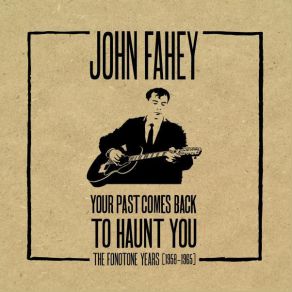Your Past Comes Back to Haunt You, Vol. 1
Download links and information about Your Past Comes Back to Haunt You, Vol. 1 by John Fahey. This album was released in 2011 and it belongs to Blues, Country, Songwriter/Lyricist, Acoustic, Contemporary Folk genres. It contains 22 tracks with total duration of 01:13:46 minutes.

|
|
|---|---|
| Artist: | John Fahey |
| Release date: | 2011 |
| Genre: | Blues, Country, Songwriter/Lyricist, Acoustic, Contemporary Folk |
| Tracks: | 22 |
| Duration: | 01:13:46 |
| Buy it NOW at: | |
| Buy on iTunes $9.99 | |
Tracks
[Edit]| No. | Title | Length |
|---|---|---|
| 1. | Interview With John Fahey On Fonotone Records and Joe Bussard | 2:59 |
| 2. | Franklin Blues | 3:15 |
| 3. | Smoketown Strut | 3:14 |
| 4. | Steel Guitar Rag | 3:24 |
| 5. | Takoma Park Pool Hall Blues | 3:31 |
| 6. | Buck Dancer’s Choice | 3:19 |
| 7. | Medley: Pretty Polly / Shortnin’ Bread | 3:40 |
| 8. | Barbara Namkin Blues | 3:13 |
| 9. | In Christ There Is No East Or West | 3:57 |
| 10. | Stak 'o Lee Blues [Louis Collins] | 3:24 |
| 11. | The Transcendental Waterfall | 3:01 |
| 12. | John Henry | 3:09 |
| 13. | Over the Hill Blues | 3:57 |
| 14. | St. Louis Blues | 4:06 |
| 15. | On Doing an Evil Deed Blues | 3:29 |
| 16. | Reinumeration Blues | 2:08 |
| 17. | The Transcendental Waterfall | 5:09 |
| 18. | Mississippi Boweavil Blues | 2:46 |
| 19. | Green River Blues | 2:59 |
| 20. | Over the Hill Blues | 2:44 |
| 21. | Libba’s Rag | 3:08 |
| 22. | Chris’s Rag | 3:14 |
Details
[Edit]Your Past Comes Back to Haunt You: The Fonotone Years, 1958-1965 is a massive John Fahey document that was a full decade in the making by Dean Blackwood of Revenant, guitarist Glenn Jones, and Lance Ledbetter of Dust-to-Digital. Released a full decade after Fahey's death, it contains 115 tracks compiling the guitarist's complete 78-rpm recordings for Joe Bussard's Fonotone label — solo, as Blind Thomas, the Mississippi Swampers, etc. — remastered from the original reel-to-reel tapes. These are Fahey's earliest recordings, the vast majority of which are previously unreleased on CD. The 12"-by-12" collection also contains an 88-page hardback book with essays and track annotations by Jones and contributions from Eddie Dean, Claudio Guerrieri, Malcolm Kirton, Mike Stewart, and R. Anthony Lee, as well as a previously unpublished 1967 interview by Douglas Blazek., Rovi